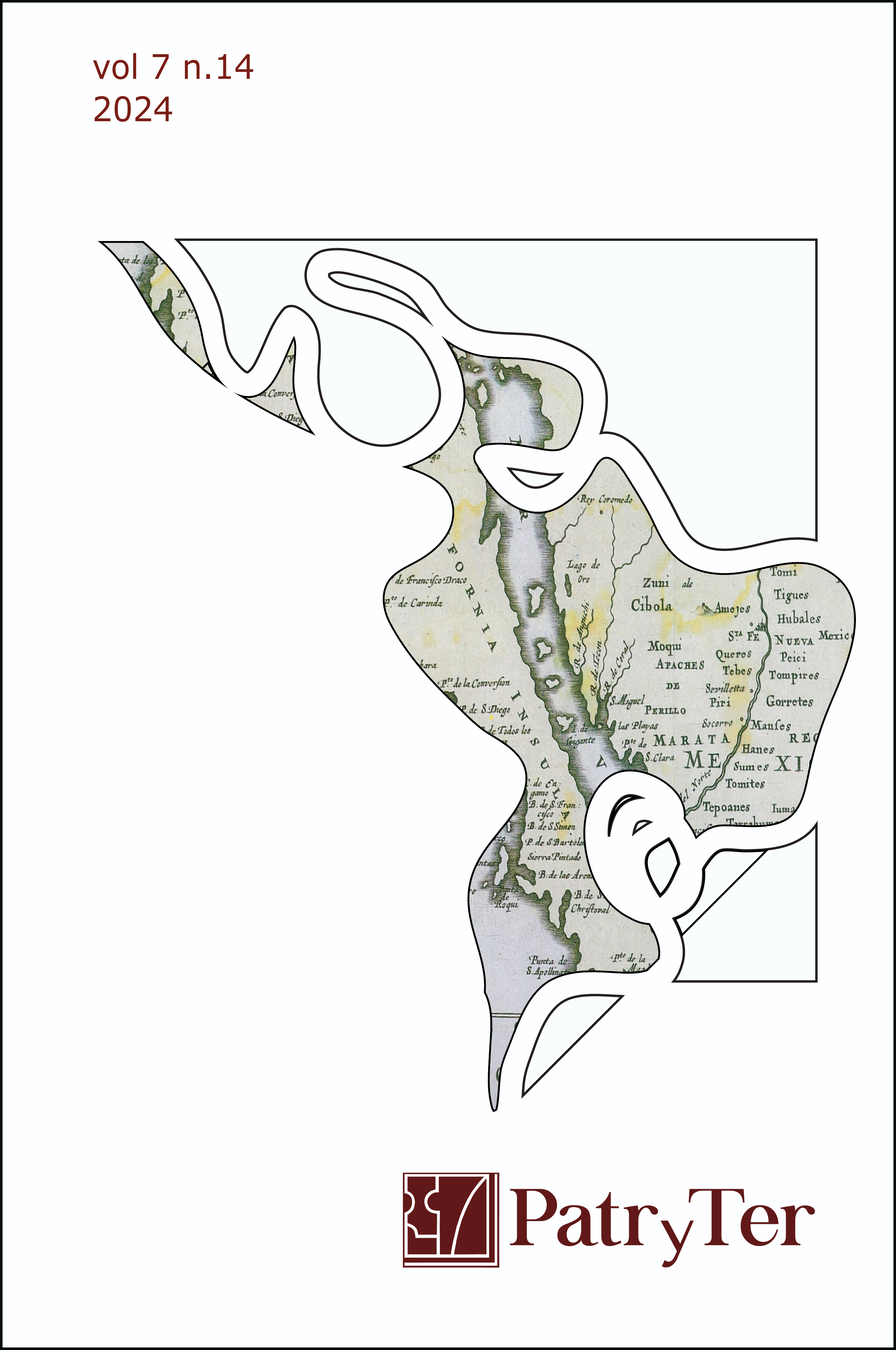Los comunes urbanos desde una perspectiva geográfica
DOI:
https://doi.org/10.26512/patryter.v7i14.46529Palavras-chave:
Comunes urbanos; neoliberalismo; geografia urbana; ativismo socioespacialesResumo
El objetivo de este artículo es contribuir con la discusión sobre los "comunes urbanos" en Geografía, buscando aportar elementos que permitan pensar el "común" como concepto de Geografía Urbana. La metodología utilizada fue el levantamiento y el análisis bibliográfico. Se intentó favorecer las obras de referencia para el tema. En la primera parte, se intentó presentar brevemente las principales aproximaciones a lo común. Luego, en las siguientes partes, el objetivo fue presentar la idea de los comunes urbanos, construyendo una noción propia a partir de ideas y conceptos ya discutidos en otros momentos. Al final, se concluye que elevar el término común a la categoría de concepto de la Geografía urbana es de suma urgencia, sobre todo si se considera la tendencia más general del activismo socioespacial contemporáneo, que ha utilizado prácticas de apropiación de espacios y construcción comunal y autogestionaria.
Downloads
Referências
Bollier, D. (2002). Silent Theft: the private plunder of our common wealth. London: Routledge.
Bollier, D. (2007). The growth of the common’s paradigm. In: C. Hess. & E. Ostrom (Ed.) Understanding knowledge as a common: from theory to practice (pp. 27-40). Cambridge: MIT Press.
Boyle, J. (2017). The second enclosure movement and the construction of the public domain. In B. Atkinson (Ed.). Copyright law (pp. 63-104). London: Routledge.
Correa, R. (1995) Espaço: um conceito-chave. In I. E. Castro; P. C. C. Gomes. (Org.). Geografia: conceitos e temas (pp. 15-47). Rio de Janeiro: Bertrand Brasil.
Dardot, P. & Laval. C (2017). Comum: ensaio sobre a revolução no século XXI. São Paulo: Boitempo.
De Angelis, M. (2007). The beginning of history: value struggles and global Capital. London: Pluto.
Federici, S. (2017). Calibã e a Bruxa: mulheres, corpo e acumulação primitiva. São Paulo: Elefante.
Federici, S. (2019). Re-enchanting the world: feminism and the politics of the commons. Michigan: PM Press.
Foster, S. & Iaione, C. (2016). The city as a commons. Yale Law & Policy Review, 34, 281-349
Hardin, G. (1968). The tragedy of the common. Science, 162(3859), 1243-1248. https://doi.org/10.1126/science.162.3859.1243
Hardt, M. & Negri, A. (2000). Empire. Cambridge: Harvard University Press.
Hardt, M. & Negri, A. (2004). Multitude: war and democracy in the age of Empire. New York: Penguin Press.
Hardt, M. & Negri, A. (2009). Commonwealth. Cambridge: Harvard University Press.
Harvey, D. (1978). The urban process under capitalism: a framework for analysis. International journal of urban and regional research, 2(4), 101-131. https://doi.org/10.1111/j.1468-2427.1978.tb00738.x
Harvey, D. (2004). O novo imperialismo. São Paulo: Loyola.
Kip, M. (2015). Moving beyond the city: conceptualizing urban commons from a critical urban studies perspective. In: M. Dellenbaugh & M. Kip (Ed.) Urban commons: moving beyond state and market (pp. 42-59). Basel: Birkhäuser Verlag GmbH.
Linebaugh, P. (2009). The Magna Carta Manifesto: liberties and commons for all. Los Angeles: University of California Press.
Luxemburgo, R. (1976). A acumulação do capital: estudo sobre a interpretação econômica do imperialismo. 2.ed. Rio de Janeiro: Zahar Editores.
Ostrom, E. (1990). Governing the Commons: the evolution of institutions for collective action. New York: Cambridge University Press.
Santos, O. & Gomes, E. (2016). A questão do desenvolvimento e os desdobramentos recentes do processo de fragmentação do espaço urbano em Recife/PE - o caso do “Projeto Novo Recife''. Boletim Goiano de Geografia, 36, 379-389. https://doi.org/10.5216/bgg.v36i2.42801
Santos, O. & Castilho, C. (2021). O espaço urbano sob o neoliberalismo e os 'territórios da vida humana' como possibilidade do 'comum'. Revista Tamoios, 17, 31-46. https://doi.org/10.12957/tamoios.2021.58497
Santos, O. (2021). Segmentação, Segregação, Fragmentação. Revista da Casa de Geografia de Sobral, 23, 455-469. https://doi.org/10.35701/rcgs.v23.817
Souza, M. (2010). Com o Estado, apesar do Estado e contra o Estado: os movimentos urbanos e suas práticas espaciais, entre a luta institucional e a ação direta. Revista Cidades, 7(11), 13-47. https://doi.org/10.36661/2448-1092.2010v7n11.12223
Stavrides, S. (2016). Common space: The city as commons. London: Zed Books.
Swyngedouw, E. (2012) A cidade pós-política. Revista e-metropolis, Rio de Janeiro, 08, 52-62
Tonucci, J. (2020). Do direito à cidade o comum urbano: contribuições para uma abordagem lefebvriana. Revista Direito e Praxis, 11(1), 370-404. https://doi.org/10.1590/2179-8966/2020/48273
Vasconcelos, P. (2009). O rigor no uso das noções e conceitos na Geografia Urbana. Revista Cidades, 6(10), 341-357. https://doi.org/10.36661/2448-1092.2009v6n10.12283
Downloads
Publicado
Como Citar
Edição
Seção
Licença
Copyright (c) 2024 PatryTer

Este trabalho está licenciado sob uma licença Creative Commons Attribution-NonCommercial-NoDerivatives 4.0 International License.
Informamos que a Revista Patryter está licenciada com uma Licença Creative Commons Atribuição-NãoComercial-SemDer
Autores que publicam na Revista PatryTer concordam com os seguintes termos:
- Autores mantém os direitos autorais e concedem à revista o direito de primeira publicação, sendo o trabalho simultaneamente licenciado sob a Licença Creative Commons Atribuição-NãoComercial-SemDer
- A contribuição é original e inédita, não está sendo avaliada para publicação por outra revista. Quando da submissão do artigo, os(as) autores(as) devem anexar como documento suplementar uma Carta dirigida ao Editor da PatryTer, indicando os méritos acadêmicos do trabalho submetido [relevância, originalidade e origem do artigo, ou seja, oriundo de que tipo de investigação]. Essa carta deve ser assinada por todos(as) os(as) autores(as).
- Autores autorizam a Revista PatryTer a veicular o artigo em bases de dados públicas e privadas, no Brasil e no exterior.
- Autores declaram que são integralmente responsáveis pela totalidade do conteúdo da contribuição que ora submetem ao Conselho Editorial da Revista PatryTer.
- Autores declaram que não há conflito de interesse que possa interferir na imparcialidade dos trabalhos científicos apresentados ao Conselho Editorial da Revista PatryTer.
- Autores têm autorização para assumir contratos adicionais separadamente, para distribuição não- exclusiva da versão do trabalho publicada nesta revista (ex.: publicar em repositório institucional ou como capítulo de livro), com reconhecimento de autoria e publicação inicial nesta revista.
Autores têm permissão e são estimulados a publicar e distribuir seu trabalho online (ex.: em repositórios institucionais ou na sua página pessoal) a qualquer ponto antes ou durante o processo editorial, já que isso pode gerar alterações produtivas, bem como aumentar o impacto e a citação do trabalho publicado (Veja O Efeito do Acesso Livre).



